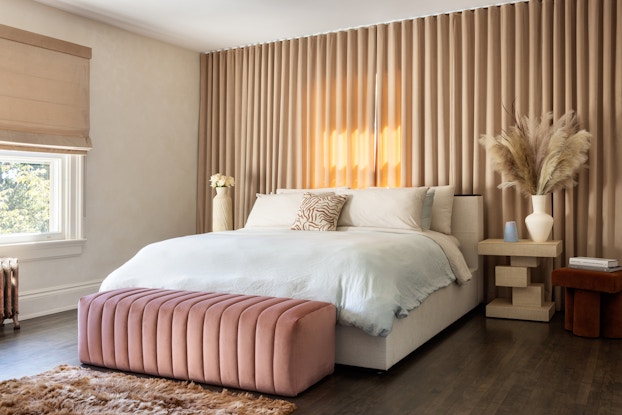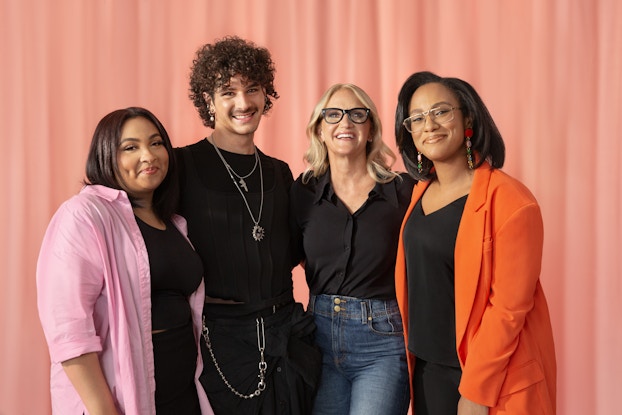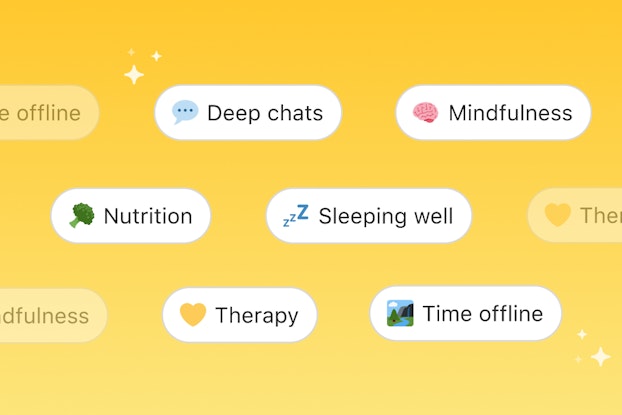
Why it matters:
- The pandemic stoked a health-and-wellness boom that included a heightened attention to mental health issues.
- Consumer spending on mental-wellness-related products and services, from digital therapy to self-improvement retreats, has grown to become a $180.5 billion industry worldwide, according to the Global Wellness Institute. And North America is by far the largest market for mental wellness, accounting for 53% of the global market.
- Against that backdrop, brands are adding a self-care dimension to everyday products and services, from Ulta’s push to help beauty consumers banish negative self-talk and spark ‘joy,’ to dating app Bumble’s efforts to help its members find a partner that supports their mental wellness journey.
Last year, Nike and Dove together launched Body Confident Sport, a science-backed coaching program for adolescent girls, an age when self-esteem tends to dip, clouding their mental skies.
At the same time, dating app Bumble heeded its members’ call for candid talk about mental health with self-care geared conversation starters such as, “I’m prioritizing my mental health by…,” that members can add to their profile page.
And at architecture and design firm RHG A+D, client discussions on residential and commercial projects increasingly consider the “spiritual experience” of design, regardless of “background, religion or theology,” according to Founder and Principal Architect Rachael H. Grochowski.
Brands and businesses across industries are coming to consumers’ emotional rescue.
They’re embracing a wellness-awakened populace by slipping mental-health elements into their business models, adding a self-care dimension to everyday products and services — from deodorant to dating sites to home design.
Businesses are marketing to the softer side of shoppers nudged by the nation’s pandemic-fostered vulnerability to boost customer engagement, engender brand loyalty, and even nudge a new revenue stream.
The global health crisis stoked a collective grief that opened the floodgates for conversations on emotional well-being, chipping away at the stigma long associated with seeking out help for mental health issues. Teletherapy, for one, moved from the margins to the mainstream just as mental-health-geared apps like Talkspace and Calm saw adoption rates soar.
“On a societal level, we have experienced a PTSD-like response collectively,” Chris Gray, a consumer psychologist who’s counted Walmart, Procter & Gamble, and Coca-Cola among his clients, told CO—. “There is a recognition [among brands] that whether it’s outwardly felt or something more tacit, mental health support is a real need right now.”
Today, consumer spending on mental-wellness-related products and services, from digital therapy to sleep gadgets to self-improvement retreats, has grown to become a $180.5 billion industry worldwide, according to the Global Wellness Institute. And North America is by far the largest market for mental wellness, accounting for 53% of the global market. So it comes as little surprise that U.S. businesses whose core product or service has nothing to do with mental health are now giving it a nod.
Consumers have even come to expect it, Wendy Liebmann, CEO of WSL Strategic Retail, told CO—. “Over the past four years, not only are Americans dealing with the vestiges of, and lack of, certainty that the pandemic created but also the chaos that has emerged from political, technological, and social change,” she said. “The convergence of all of this has meant that people are looking for brands and retailers that are empathetic to their situation, open and inclusive, and give them some degree of control over the chaos.”
Trend forecasting firm TrendWatching says we’ve entered the “age of healing,” as consumers court new paths to enlightenment. “The relentless pursuit of self-improvement is giving way to self-transformation, with the pandemic having acted as a catalyst for personal growth. People's definition of wellness is constantly evolving, moving beyond the physical to encompass mental, emotional, spiritual, and social health,” according to a TrendWatching report. “This reprioritization means that every brand needs to … integrate wellness into products, services, experiences, campaigns and more.”

Mental wellness hits home: Architecture and interior design that facilitates ‘emotional and spiritual’ health is a growing business
Wellness real estate, what the Global Wellness Institute defines as buildings, neighborhoods, and communities expressly designed to buoy the holistic health of their residents, occupants, and visitors, has emerged as one of the fastest-growing sectors of the wellness economy.
And increasingly, “projects, design amenities, and services facilitate mental, emotional, and spiritual wellness,” according to the GWI’s Global Wellness Economy Monitor 2023 report. “The design may provide space and support for contemplation, rest and solace; encourage residents to pursue personal hobbies, interests and spiritual practices; and support residents in managing technology and work/life balance,” the report said. “An emerging understanding of how our minds respond to multiple senses (sight, sound, scent and feel) will increasingly inform mental wellness design in the future.”
The trend is showing up in architecture and interior design.
It’s altered the conversations that unfold between RHG A+D’s Grochowski and her commercial and residential clients, who’ve become more attuned to the relationship between “nature, the built environment, and mind and body — there’s a ton of psychology,” she said, during the “Design is Spiritual” panel discussion at the NYCxDesign Festival attended by CO—.
The process of coaxing clients to express the sensory experiences they want their living spaces to evoke via textures, finishes, and materials in the home requires “a lot of question asking,” she said. Prompts like, “‘What is it in your space that’s relaxing?’” and “‘How do you want to feel in your home? These days there’s a lot of room in the conversation for reverence. It’s more than the concept of a rug or a chair. Beauty is about experience, not an object.”
For example, “Our client with a demanding career wished for a place she could exhale, feel the tension release, so that she would be able to rest well,” Grochowski told CO—. We spoke of sleep as a value, with the understanding that this is when our body repairs and our mind releases worry, when we return to ourselves.”
[Read: Retailers Turn Pandemic-Fueled Self-Care and WFH Trends Into Business Opportunities]
On a societal level, we have experienced a PTSD-like response collectively. There is a recognition [among brands] that whether it’s outwardly felt or something more tacit, mental health support is a real need right now.Chris Gray, Consumer Psychologist
Taking on the beauty myth: Dove and Ulta tackle low body confidence and negative self-talk
Amid concerns that the surging popularity of weight-loss drugs like Ozempic threaten the hard-won gains of the body positivity movement, Dove’s Body Confident program gives sports coaches an evidence-based online tool to counter low body confidence and stem the trend of girls ditching sports when they hit adolescence.
The campaign follows the tradition of Dove’s influential "Real Beauty” ads from 2004, which swapped out models to celebrate real women in all shapes and sizes, taking a proverbial swipe at the industry’s longstanding legacy of promoting narrowly defined beauty standards.
“Real Beauty was a milestone that was a big gamble, and the way it took off accelerated conversations about, ‘Who are we, really?’” consumer psychologist Gray said. “It was a predecessor to what we’re seeing now.”
As the pandemic ushered in unvarnished discussions on mental health, “Brands are seeing that and finding opportunities to create deeper relationships with consumers,” he said.
Ulta Beauty saw an opening to do just that after sales associates noticed a theme emerge when serving customers in its 1,350 stores: Negative self-talk darkened customers’ mood.
Taking in that feedback, Ulta executives got curious about how this pervasive inner critic dampened the well-being of beauty consumers in general. It commissioned The Joy Study, which examined how 5,300 U.S. adults and teens experience joy, and common barriers to that joy on an everyday basis.
The research revealed that 73% of survey respondents experience negative self-talk, and 91% identified negative self-talk as their prime obstacle to experiencing joy.
So Ulta launched The Joy Project, a training program to help store associates—and, by extension, Ulta’s customer base—show their inner critics the door. Designed with motivational speaker Mel Robbins, the “Toolkit for Joy” series of mini courses offers Ulta associates strategies to identify their inner critic, interrupt the negative thought patterns, and then share those practices with customers. Ulta is hoping The Joy Project ignites a social movement that goes far beyond its stores. It’s thus far generated “strong engagement and positive social sentiment,” Dave Kimbell, CEO, said during the company’s March earnings call.

Bumble wants to help daters find a match ‘that will support you and your self-care’
In keeping with national dating trends and the psyches of single folks in a post-pandemic world, Bumble discovered that its members are increasingly placing a premium on their emotional well-being.
More than half of the app’s subscribers said the ability to have open, comfortable conversations about their mental health with a potential romantic partner is critical to gauging compatibility, a Bumble survey revealed.
To make it easier for daters to spark those conversations, Bumble added ‘Profile Prompts,” (questions that members answer about themselves), such as, “My mental health game changer was…” and “I’m prioritizing my mental health by…”
It also added new “Interest Badges,” which indicate how members like to spend their time, be it knitting or reading, to include “therapy,” “mindfulness,” and “deep chats.”
The idea, says Bumble, is to help daters “find people who will support you and your self-care.”
For businesses, it’s far easier to have these types of conversations with consumers today, said Gray. But it’s about “starting from a place of empathy. That is, simply being able to see the world through the eyes of consumers, addressing what they want to hear from you versus what you want to say, and listening and engaging,” he said. “Go spend time with them, and you’ll find insights that you’d never thought to ask about.”
CO— aims to bring you inspiration from leading respected experts. However, before making any business decision, you should consult a professional who can advise you based on your individual situation.
CO—is committed to helping you start, run and grow your small business. Learn more about the benefits of small business membership in the U.S. Chamber of Commerce, here.






